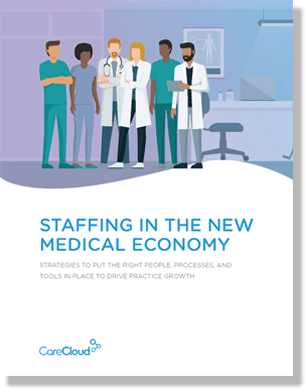Many more practices are considering the cloud computing option. After all, it’s more than just a buzzword – it’s fast, less clunky, highly efficient, scalable, and usually cheaper.
Not to mention, when cloud-computing options are secure, they minimize privacy issues and all but eliminate security concerns. It also democratizes bandwidth and processing power, so organizations can scale their needs.
Check out why cloud computing is such an efficient way to go for your practice.
Facing Challenges with Advanced Solutions
Whether it’s a health system with 400 doctors or a small practice with two physicians, both have the same concerns for coding, security, compliance, and privacy. Yet EHR mandates and new regulations and standards are changing the practice management landscape for everyone. All organizations have to adapt. That’s where cloud computing can make the difference.
For a medical organization to duplicate the technological capabilities that CareCloud, Terremark, and Intel brought to South Florida Medicine (as detailed in last week’s post) would be cost-prohibitive and impractical to maintain. However, the power of the cloud provides any medical organization the benefit of these advanced systems at a fraction of the cost.
Secure cloud-computing solutions running on Intel architecture, such as those from CareCloud and Terremark, help minimize privacy issues and reduce concerns about security and compliance. Even small medical practices have access to the same bandwidth and processing power as a large hospital, and can easily scale their computing needs as the organization grows, or as regulations and standards change.
Cost-efficient Choice
As in any industry considering a technology migration, the cost is a major concern. Yet, cloud computing proves much more cost-effective than internally supporting and maintaining servers, hardware, software, and technical personnel who are often not experts in EHR. According to the CDW Cloud Computing Tracking Poll, 88 percent of healthcare organizations that use cloud computing have reduced IT costs by an average of 20 percent annually. But that’s not the only monetary benefit. Cloud computing for EHR can even help a clinic get paid for its effort. In a matter of months, a medical practice served by CareCloud earned $21,500 per physician from Medicaid for meeting Stage-1 Meaningful Use criteria, a timeframe made possible by the capabilities of cloud computing.
A Brighter, Cloudier Future
Cloud computing can free medical practices from the burden of supporting IT systems in-house, yet enable open access to data, files, analysis, and reporting, all within a secure and compliant environment. It’s how cloud computing, coupled with secure hosting and advanced processing, can help the healthcare industry meet the challenges of a changing practice management landscape.



